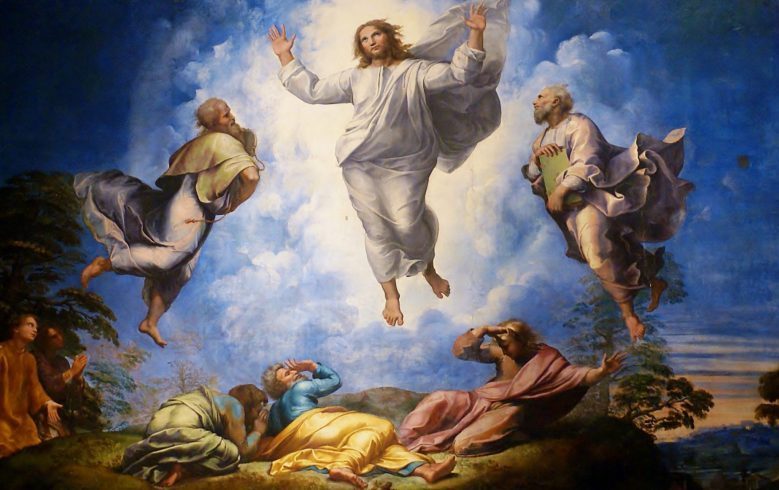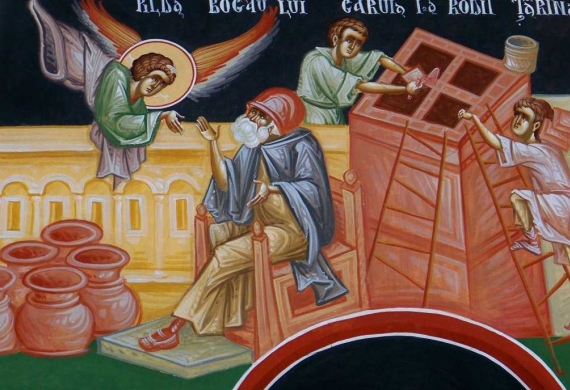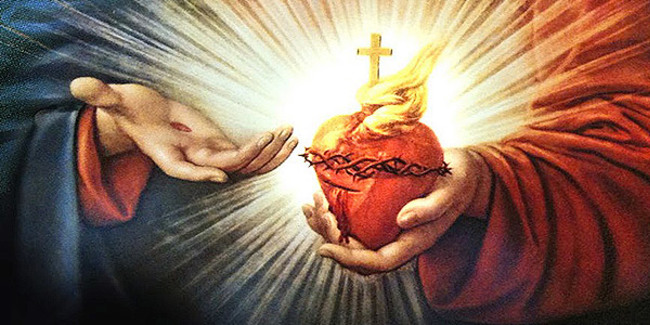This feast of the Transfiguration of the Lord can be a puzzling one for us to understand. It’s an event we’ve heard about in Gospel readings, but it’s not something that we’ve ever seen. So it’s hard, I think, for us to figure out. If that’s true of us, we shouldn’t feel too bad: it’s clear that Peter, James and John, disciples who were clearly in Jesus’ “inner circle” didn’t get it either. In fact, they were so frightened by it that they hardly knew what to say.
But as we reflect on this feast, we should see that the Transfiguration is a sign for us of three things: it’s a sign of who Jesus really is, a sign of what would happen in the paschal mystery, and a sign of what is to be for those who believe.
First, then, it is a sign of who Jesus really is. We get three very beautiful clues to Jesus’ true identity here. First, there is the transfiguration, or change, itself. Jesus is transfigured, and his clothes become dazzling white. He literally shines with the Glory of God. This perhaps reminded the people of Jesus’ time of the way Moses’ face was said to shine after he came down from the mountain where he conversed with God. It also reminds us of the way the figure who was “one like a son of man” shone in today’s first reading. The transfiguration tells us that Jesus is no ordinary man, that the divinity the had from the beginning but set aside at his Incarnation, that divinity was ready to burst forth from him at any moment. It did in today’s Gospel, and Peter, James and John were witnesses of it. The second clue is the appearance of Moses and Elijah with Jesus. This appearance linked Jesus with Israel’s past, Moses representing the Law and Elijah the Prophets. His conversation with Moses and Elijah underscore that Jesus’ ministry in the world was part of God’s plan for our salvation. The third clue is the voice of God. “This is my beloved Son. Listen to him.” If there had been any doubt, it had to be gone by now. Rarely does God speak in such a direct manner to his creation, but he did it here. Jesus was his beloved Son, and Peter, James and John – and all of us too – would do well to listen to him.
Second, the Transfiguration is a sign of what would happen in the Paschal Mystery. The incredible event of Jesus’ Transfiguration foreshadows the glory of the Resurrection. It’s a peek at what Jesus would look like after he rose from the dead. You may remember that the first witnesses of the Resurrection had a hard time recognizing Jesus. That may be because he was transfigured by the Resurrection, and so today’s event is perhaps a foreshadowing of what that would be like. Yes, Jesus would have to suffer and die, but his Resurrection and Ascension would be glorious, and would open the possibility of glory to all of us as well.
Third, the Transfiguration is a sign of what waits for us who believe. The glory that we see in Jesus today is the glory that waits for all of us. We have hope of the Resurrection, we have hope of an eternal home in heaven. The Transfiguration shows us that this hope is ours, if we but listen to the one who is God’s beloved Son. Sure, we come to that as those who don’t deserve that kind of glory. We are in need of our own kinds of transfigurations. We are in need of our sins being transfigured into faithfulness, of our failures being transfigured into joys, of our death being transfigured into everlasting life. All of those transfigurations are accomplished in us when we but listen to God’s beloved Son.



You must be logged in to post a comment.